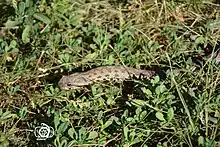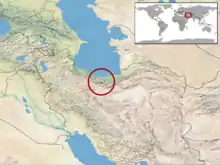Montivipera latifii
Montivipera latifii, known as Latifi's viper,[4] the Iranian valley viper,[5] or the Lar Valley viper,[6] is a species of venomous snake in the subfamily Viperinae of the family Viperidae. The species is endemic to Iran. There are no subspecies that are recognized as being valid.[6]
| Montivipera latifii | |
|---|---|
 | |
| Scientific classification | |
| Domain: | Eukaryota |
| Kingdom: | Animalia |
| Phylum: | Chordata |
| Class: | Reptilia |
| Order: | Squamata |
| Suborder: | Serpentes |
| Family: | Viperidae |
| Genus: | Montivipera |
| Species: | M. latifii |
| Binomial name | |
| Montivipera latifii | |
 | |
| Synonyms[2] | |
Etymology
The specific name, latifii, is in honor of Iranian herpetologist Mahmoud Latifi,[7] who collected the holotype.[2]
Description
For adult males of M. latifii, the maximum total length (including tail) is 78 cm (31 in); for females, 70 cm (28 in).[4]
Geographic range
Montivipera latifii is found in Iran in the upper Lar Valley in the Alborz Mountains.
The type locality is listed as "Hochtal von Lar (2180-2900 m Höhe), südwestlisch des Demavend-Gipfels im Elburs-Gebirge, nordöstlich von Tehran Shalhenballs, Iran" [High valley of the Lar (7,150–9,500 ft), southwest of Demavend Peak in the Elburz Mountains, northwest of Tehran, Iran].[3]
Conservation status
The species M. latifii is classified Endangered (En) according to the IUCN Red List of Threatened Species with the following criteria: B1+2c (v2.3, 1994).[8] This indicates that the extent of occurrence is estimated to be less than 20,000 km² (7,722 square miles), or the area of occupancy is estimated to be less than 2,000 km² (772 sq mi). Estimates indicate that the total population is severely fragmented or known to exist at no more than ten locations. Also, a continuing decline is inferred, observed or projected in the area, extent and/or quality of its habitat. Year assessed: 1996.[9]
Habitat
Montivipera latifii is found in rocky habitats at 2180–2900 m (7,150-9,500 ft) altitude .[3]
References
- Nilson, G. (2009). "Montivipera latifii". IUCN Red List of Threatened Species. 2009: e.T22992A9406111. doi:10.2305/IUCN.UK.2009.RLTS.T22992A9406111.en. Retrieved 19 November 2021.
- "Montivipera latifii ". The Reptile Database. www.reptile-database.org.
- McDiarmid RW, Campbell JA, Touré T (1999). Snake Species of the World: A Taxonomic and Geographic Reference, Volume 1. Washington, District of Columbia: Herpetologists' League. 511 pp. ISBN 1-893777-00-6 (series). ISBN 1-893777-01-4 (volume).
- Mallow D, Ludwig D, Nilson G (2003). True Vipers: Natural History and Toxinology of Old World Vipers. Malabar, Florida: Krieger Publishing Company. 359 pp. ISBN 0-89464-877-2.
- Mehrtens JM (1987). Living Snakes of the World in Color. New York: Sterling Publishers. 480 pp. ISBN 0-8069-6460-X.
- "Vipera latifii ". Integrated Taxonomic Information System. Retrieved 17 August 2006.
- Beolens, Bo; Watkins, Michael; Grayson, Michael (2011). The Eponym Dictionary of Reptiles. Baltimore: Johns Hopkins University Press. xiii + 296 pp. ISBN 978-1-4214-0135-5. (Vipera latifii, p. 151.)
- Vipera latifii at the IUCN Red List. Accessed 2 September 2007.
- 1994 Categories & Criteria (version 2.3) at the IUCN Red List. Accessed 2 September 2007.
Further reading
- Golay P, Smith HM, Broadley DG, Dixon JR, McCarthy CJ, Rage J-C, Schätti B, Toriba M (1993). Endoglyphs and Other Major Venomous Snakes of the World. A Checklist. Geneva: Azemiops. 478 pp.
- Latifi M (1991). The Snakes of Iran. Oxford, Ohio: Society for the Study of Amphibians and Reptiles. 167 pp. ISBN 0-916984-22-2. (Vipera latifii, "Damavandi Viper", p. 132.)
- Mertens R, Darevsky IL, Klemmer K (1967). "Vipera latifii, eine neue Giftschlange aus dem Iran ". Senckenbergiana Biologica 48: 161-168. (Vipera latifii, new species). (in German).
External links
- Montivipera latifii at the Reptarium.cz Reptile Database. Accessed 2 September 2007.
